Horses are herbivores, they get their nutritional requirements from eating plants, and only plants. They have a very sensitive and extremely long digestive tract, different from humans and designed to digest only plant matter. Horses must consume lots of fibers to keep their different systems functioning.
Let’s be specific. What do horses eat in plants? How many times a day should horses eat? And how much should horses eat? Lastly, what should horses not eat?
Read on, and you will find answers to these questions in the lines below.
What Do Horses Eat
What do horses eat? As said above, horses are herbivores, fulfilling their nutritional requirements only from plants. Instead of eating one whole meal, horses eat in small portions throughout the day. This is why it is often said that horses spend their life eating.
Usually, the time of their eating depends upon many factors like:
- Consumption behavior
- Type and availability of forage
- Level of nutrient demand
So, the question is what should they eat? Naturally, horses want to graze all day—they eat little but eat often. But, according to the condition and situation, there are many options for horses (given below). Let’s take a closer look at different horse feeds.
| Types of Horse Food |
| Water |
| Pasture Grass and Tender Plants |
| Hay |
| Grains |
| Concentrate Mixes |
| Salt and Minerals |
| Treats |
1. Water
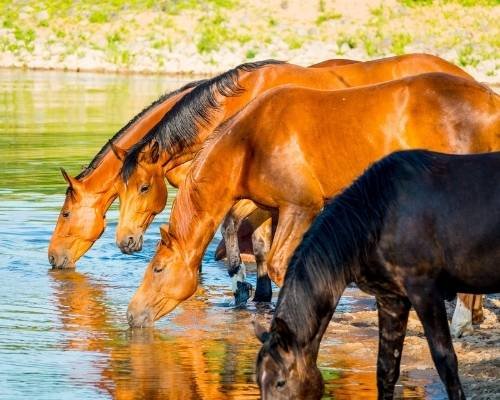
Water is a fuel that keeps all living bodies functioning. Like other living beings, water is an essential element of horses’ diet.
Horses can tolerate the lack of water for extended periods, almost 1-2 days. Their body naturally initiates the breaking down of proteins, fats and carbohydrates to produce metabolic water.
After 3-4 days, its body organs will begin to shut down, causing irreversible damage.
To keep your equine healthy and hydrated, provide them with a continuous supply of fresh and clean water.
How much water horses need depends upon the season, region, diet, size, and activity. Horses feeding on fresh feed might not require as much water as those feeding on preserved or dry food. Similarly, those who are involved in extensive activities would need more water. Generally, a 500kg horse would require up to 40 liters of water a day.
2. Pasture Grass and Tender Plants
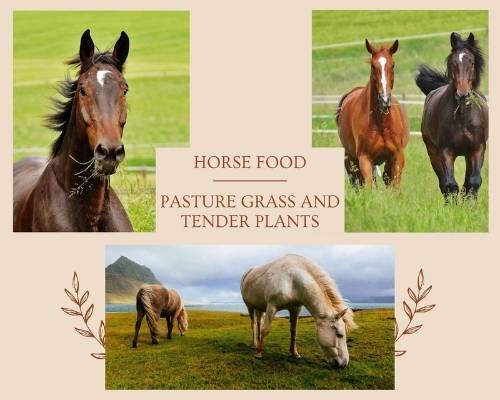
These herbivorous animals feed on grass and other plants, getting fiber from them to digest their food properly.
The horses’ digestive system is intended to break down forage, extracting nutrients and energy required for the proper functioning of their bodies.
Horse dieticians and vets recommend that horses should eat 2% of what they weigh every day in forage to maintain a healthy digestive system.
In herbivores, horses are non-ruminant herbivores, meaning that do not have multi-compartmented like other cattle. Their stomach is designed to digest only foods high in fiber, and low in starch—primarily grasses.
There are two types of grass:
| Type of Grass | Examples |
| Warm season grass | It includes crabgrass, Bermuda grass and Bahia grass |
| Cold season grass | It includes Orchard grass, Kentucky bluegrass and Timothy grass |
Early spring grasses are rich in carbohydrates, disturbing the balance of gut bacteria, which may cause a horse to founder. Therefore, it is often recommended to keep equine off pasture during April and May (young grass) due to the health risks these grasses pose.
3. Hay
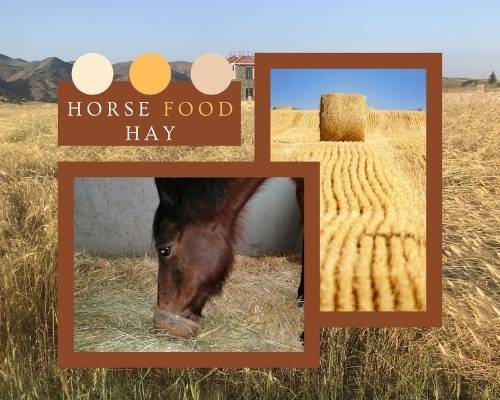
Grass availability may be limited in winters, or in some places, the rass is not usually available, such as desserts or cold areas. A suitable replacement of grass for horses, in such cases, becomes hay.
Hay will provide roughage when natural pasture and tender plants are unavailable in a region or season.
Hay is good for horses, but it is to be kept in mind that not all hays are the same. Types of grass, as mentioned above, used and the method followed for its preservation determine the nutritional value of the hay.
Its quality is influenced by the way it is harvested, as not all grasses are cut at the same position and in the same conditions. Timothy grass is harvested from the head when it is 1 ½ inch long, whereas Alfalfa grass is cut from the bud during early bloom stages.
Good hay is difficult to find; therefore, it is necessary to test the nutritional values of the hay before feeding it to your horse. It will also let you know if you need to add any supplements to the hay. Like rich grass from the pasture, hay rich in carbs can also cause serious stomach issues.
Equines can do well on an only-hay diet but cold blood horses—horses used for heavy and slow work—may require extra diet supplements along with grains to get required proteins and vitamins.
4. Grains
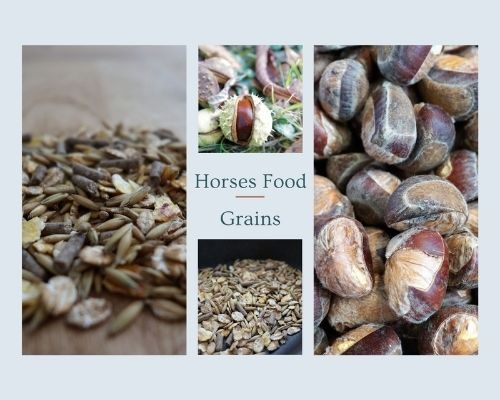
Grains provide a burst of energy to overcome nutrients lost during strenuous activities. Traditional grain fed to horses are oats and corns.
However, some grains like wheat are considered a health hazard for horses, as it contains amylopectin A and gliadin, causing colic by impacting the gastrointestinal tract of horses.
The most appropriate grain meal for horses is considered as a 50:50 ratio of oats and corns. It is considered an easy-to-feed diet because it does not require chewing.
Too much of a grain-based diet can cause ulcers and dental problems in horses. Similarly, overeating may also lead horses to founder or colic.
5. Concentrate Mixes
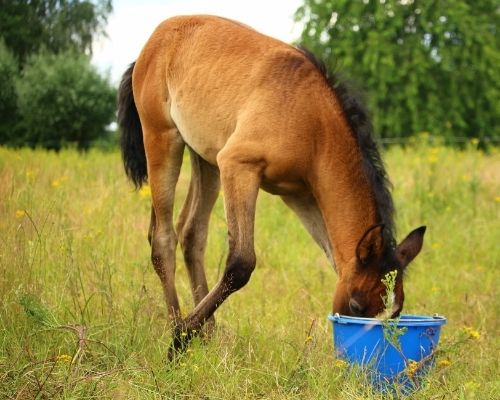
Concentrate mixes include the mixture of many things like flaxseed, molasses grains, bran, cottonseed meal, beet pulp, minerals and vitamins, flavors and other ingredients. Concentrate mixes are only to be given as supplements to different horses, such as horses for heavy work, racing, and other activities.
Grain concentrate mixes are a quick source of energy, used to compensate for the nutritional deficit during arduous workouts.
As the old adage goes, excess of everything is bad; too much of concentrated mix can cause nutritional imbalance, leading to severe health conditions like colic.
It is recommended to give these mixes along with grass or hay to keep your horse healthy.
6. Salts and Minerals
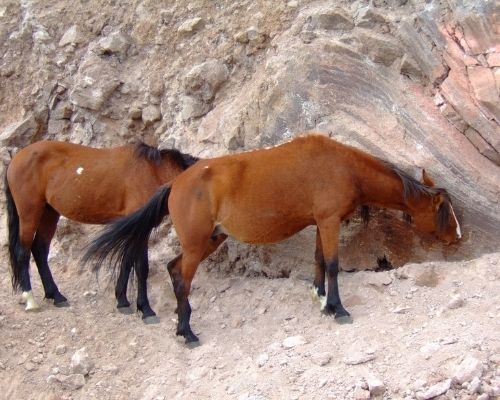
Salts help horses in their nerve and muscle activity; therefore, horses require them for proper body functioning.
A normal horse needs about 10 – 12 grams of sodium chloride per day. This is an average and can be increased, depending upon how much a horse sweat.
The need for the intake of salt increases in summers. If a horse’s regular diet lacks adequate salt, they start eating dirt, making them sick.
Lack of salts leads to distress, causing dysfunction of muscles and nerves.
7. Treats
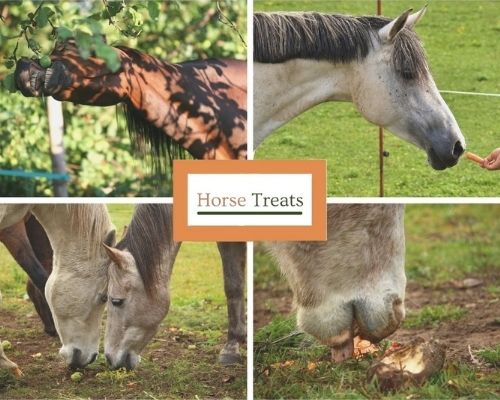
Treats for horses include things like carrots, apples, sugar cubes or candies, a handful of grains, and some other odd foods like boiled eggs.
Some of us may wonder if horses can eat meat? The answer is, they don’t. Horses are herbivores, and might not show any outward sign but still feeding them meat may cause discomfort and affect the intestine flora.
Like other meals, treats are considered only a part of their overall feeding plan. Lastly, treats should also be fed in moderation.
Horses are famous for their abilities on farms and in ranches. To catch up with their nutritional requirements, it is essential to know what do horses eat. Diet is considered a key element for a healthy and active horse. A horse’s diet is a mixture of pasture grass, tender plants, hay, grain, and concentrated mixtures. Salt is usually skipped while mentioning the horse diet—as they usually get it from their staple diet—but it is its main component, helping in proper nerve and muscle functioning.
